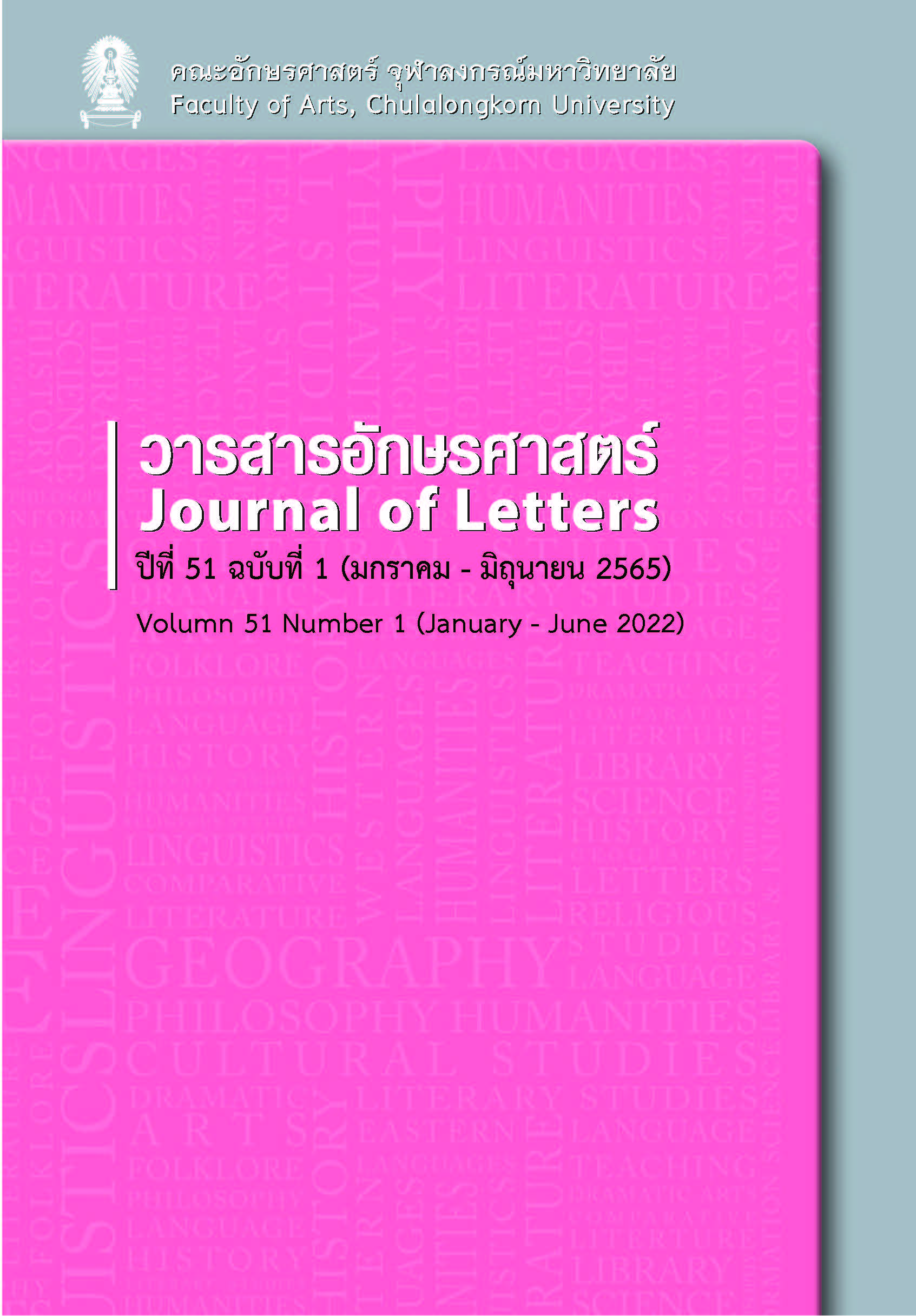An Online Poetry Laboratory Project :
Creation and consumption of Thai digital poetry
Keywords:
digital poetry, contemporary Thai poetry, globalization, poetry space in the digital world, Poetry LaboratoryAbstract
This article is a part of a Ph.D. thesis titled “Digital Poetry in the Thai Social Context (2012 – 2021).” In terms of creating and reading literature, digital media is the new choice for Thai writers and readers. How will Thai poets and poetry be transferred to and created in these digital spaces? The project “Poetry on the Cloud” is an experimental laboratory aiming to open a space for creativity and poetry on online media by hosting 10 forums. This study found that digital poetry area and online poetry reading events are a new way for poets to quickly reach large audiences, allowing readers to read simultaneously with poets reading their own poems aloud, an aspect of the artform that online media are helping to revive. There is also creative coordination with various arts, both performance and music, adding to the enjoyment of poetry. The content of the online poetry reveals the attitude of Thai poets towards poetry in the digital age. Poetry continues to be a form of expressing emotion and recording people’s lives and Thai society in the era of globalization and digital society. The project has also opened up a space for poets to create works with readers or listeners as readers can collaborate with poets online to have greater access. It is a forum for exchanging knowledge between senior poets and the new generation as well as fostering poetry criticism.
References
ภาษาไทย
Kosol Jitvirat โกศล จิตวิรัตน์. (2018). Model karn plaptua khong ongkarn turakit thi dairap ponkratop chak karntamlailang khong technology digital nai sattawat thi 21 โมเดลการปรับตัวขององค์การธุรกิจที่ได้รับผลกระทบจากการทำลายล้างของเทคโนโลยีดิจิทัลในศตวรรษที่ 21 [Adaptation model of business organizations from the digital disruption impact in the 21st century]. Warasarn samakom nakwichai วารสารสมาคมนักวิจัย [Journal of the Association of Researchers], 23(2), 74-88. http://www.ar.or.th/ImageData/Magazine/20049/DL_10400.pdf?t=636748456652662755
Chanchira Laorach จันทร์จิรา เหลาราช. (2021). Karn prapplian su digital lae ponkratop tor ongkorn การปรับเปลี่ยนสู่ดิจิทัลและผลกระทบต่อองค์กร [Digital transformation and impacts to organization]. Manutsayasat san มนุษยศาสตร์สาร [Journal of Human Sciences], 22(1), 227-240. https://so03.tci-thaijo.org/index.php/JHUMANS/article/download/243693/168828
Natruethai Ployhirun ณัฐฤทัย พลอยหิรัญ. (2021). Ruam botkawe “rai kham bandan chai” รวมบทกวี “ร่ายคำบันดาลใจ” [Poetry on the Cloud]. Retrieved Dec 31, 2021, from https://drive.google.com/file/d/1RTEBIIRtBaE6-aXsUHNIk1c2ZC4zO_1k/view?fbclid=IwAR3_bI3rcUTmdz98Jla-ZqkoBJlb3WMuWnuqDIC7sgPMsqFQUfy5FTf70UM
Tipanong Jintawijit ทิพย์อนงค์ จินตวิจิต. (2019). Karn lom salai khong nittayasarn Thai nai yuk digital การล่มสลายของนิตยสารไทยในยุคดิจิทัล [Magazine collapse in the age of digital disruption in Thailand]. Warasarnsat วารสารศาสตร์ [Journal of Journalism], 12(2), 237. https://so06.tci-thaijo.org/index.php/jcmag/article/view/158549/132864
Nopporn Prachakul นพพร ประชากุล. (2009). “Sai haeng” kap “samong tan”: Kapdak kawe Thai samai mai “ไส้แห้ง” กับ “สมองตัน”: กับดักกวีไทยสมัยใหม่ ["Poverty" and "mental block": The trap of modern Thai poets]. In Yok aksorn yon khwamkit lem 1 wa duey wannagam ยอกอักษร ย้อนความคิด เล่ม 1 ว่าด้วยวรรณกรรม [The complicated realm of thoughts and languages in literature book 1] (pp. 237 - 245). Vibhasa Publishing; Arn Publishing.
Pramote Rawin ปราโมทย์ ระวิน. (2010). Kawenipon waduai kawenipon nai kawenipon Thai ruam samai กวีนิพนธ์ว่าด้วยกวีนิพนธ์ในกวีนิพนธ์ไทยร่วมสมัย [Matapoetry in contemporary Thai poetry] [Master's thesis, Chulalongkorn University]. CUIR. http://cuir.car.chula.ac.th/handle/123456789/36458
Attapon Pamakho อรรถพล ปะมะโข. (2020). Wannakam digital prasopkarn karn-arn thi tang ork pai chak thi koei sampat วรรณกรรมดิจิทัล ประสบการณ์การอ่านที่ต่างออกไปจากที่เคยสัมผัส [Digital literature: The different reading experience from before]. Research Cafe. Retrieved Apr 8, 2022, from https://researchcafe.org/digital-literature-2/
ภาษาต่างประเทศ
Benthien, C. (2021). Poetry in the digital age. International Network for the Study of Lyric. Retrieved Mar 30, 2022, from https://lyricology.org/poetry-in-the-digital-age/#anthology-title-6
Diya. (2020). Poetry in the Digital Age. Manipalblog. Retrieved Apr 8, 2022, from https://manipalblog.com/poetry-in-the-digital-age/
Hoods, L. (2018). It’s alive: An exploration of contemporary poetry in the digital age using Rupi Kaur as a case study [Master’s thesis, Ryerson University]. RShare. https://rshare.library.ryerson.ca/articles/thesis/IT_S_ALIVE_an_exploration_of_contemporary_poetry_in_the_digital_age_using_Rupi_Kaur_as_a_case_study/14657658
Naji, J. (2012). Poetic machines: An investigation into the impact of the characteristics of the digital apparatus on poetic expression [Doctoral dissertation, Dublin City University]. CORE. https://core.ac.uk/download/pdf/11311202.pdf
Schaefer, H. (2016). Poetry in transmedial perspective: Rethinking intermedial literary studies in the digital age. Acta Universitatis Sapientiae, Film and Media Studies, 10(1),169–182. http://dx.doi.org/10.1515/ausfm-2015-0033
Pavlik, J. V. (2008). Media in the Digital Age. Columbia University Press. https://books.google.co.th/books?hl=en&lr=&id=HbCs5rEEr1AC&oi=fnd&pg=PR9&dq=digital+age&ots=SzpGIy0AtN&sig=ticVW9gTXKGSZyLMWjaeqCbv6Y&redir_esc=y#v=onepage&q=digital%20age&f=false
Robinson, P. (n.d.). How has the Digital age changed culture and communication? Academia. Retrieved Apr 6, 2022, from https://www.academia.edu/16116253/How_has_the_digital_age_changed_culture_and_communication
Rosario, G. D. (2009). Digital poetry: A naissance of a new genre? Carnets, Première Série - 1 Numéro Spécial, 183-205. https://doi.org/10.4000/carnets.3762
Rosario, G. D. (2011). Electronic poetry: Understanding poetry in the digital environment. University of Jyväskylä. https://jyx.jyu.fi/bitstream/handle/123456789/27117/9789513943356.pdf
Weller, T. (Ed.). (2013). History in the digital age. Routledge. https://books.google.co.th/books?hl=en&lr=&id=K9eTAgAAQBAJ&oi=fnd&pg=PP1&dq=digital+age&ots=0hnECfuiL&sig=Qn5QNXwilMyzrEZMElr7ZFfzFo&redir_esc=y#v=onepage&q=digital%20age&f=false
Downloads
Published
How to Cite
Issue
Section
License

This work is licensed under a Creative Commons Attribution-NonCommercial-NoDerivatives 4.0 International License.
Copyright and plagiarism
Authors are responsible for obtaining permission to use copyrighted materials from copyright owners. Authors are responsible for observing requisite copyright law when quoting or reproducing copyrighted materials. Quotations and reproductions of content from other published sources must be accompanied by a reference and all sources should be clearly listed in the references section. Quotations and reproductions of content from external sources without due attribution could be considered a severe infringement of academic conduct and may constitute a legal offence under the Copyright Act of B.E. 2537. Any legal ramifications arising from the infringement of copyright regulations would be the sole responsibility of the author(s).



